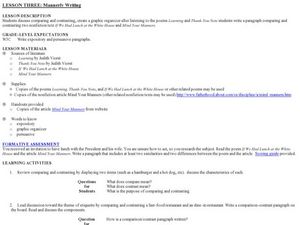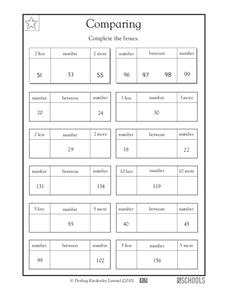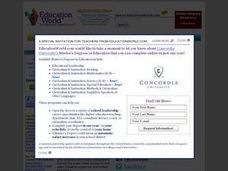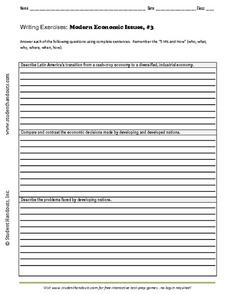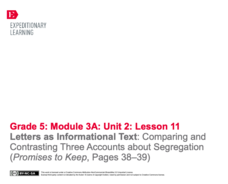Curated OER
Paragraph Development Exercise: Contrast
After reading an example, writers compose a paragraph that focuses on contrasting ideas. The resource starts out with some information about topic ideas and functional ideas, but there could be more explanation. Use this as a warm-up...
Curated OER
Mannerly Writing
Writers draft paragraphs comparing and contrasting the author's viewpoint in two poems. They also discuss the differences between an informational text and a poem regarding manners. Rubric and assessment are provided.
Curated OER
Comparing
Examine short number sequences to help scholars explore value comparisons. They look at various given numbers (both two-digit and three-digit) and write in values that are less or more by specific one-digit numbers (i.e. three less, two...
Florida Center for Reading Research
Comprehension: Text Analysis, Compare and Contrast
Grab any two topics, some index cards, and a couple of kids, and you're ready to compare and contrast! The resource provides instructions for this method and three graphic organizers in addition to or in place of the index cards.
Fluence Learning
Writing About Literature: Comparing and Contrasting Characters in Heidi
Scholars read excerpts from the story, Heidi, in a three-part assessment that focuses on comparing and contrasting characters. Each part contains three tasks that challenge learners to discuss, answer comprehension questions,...
Curated OER
The Iditarod Race Compared with the Movie, Iron Will
Feel the freezing rush of an Alaskan sled dog race in this reading lesson. Using research about the Iditarod Trail Sled Dog Race, seventh graders compare and contrast the depiction in the movie Iron Will. The lesson lasts for seven days...
School District of Palm Beach County
Framed Paragraphs characterization, problem and solution, symbolism, conflict
Support your learners as they work on writing paragraphs by providing graphic organizers, outlines, and frames. Sift through this packet to find the perfect organizers and templates to prepare pupils for writing. The resource...
Thoughtful Education Press
Compare and Contrast
Encourage readers to compare and contrast the information that they find in informational text with a variety of reading passages and worksheets. Learners read all about subjects in science, social studies, and literature before...
EngageNY
Summarizing Complex Ideas: Comparing the Original UDHR and the "Plain Language" Version
The eighth lesson plan in this series continues the focus on vocabulary and increasing young readers' awareness of academic language. Pairs of learners participate in a short vocabulary review activity called Interactive Words in which...
Curated OER
Reading a Comparison-Contrast Essay
Turn your passive readers into active readers with an engaging lesson on reading informational text. Focused on compare and contrast structured essays, the activity prompts elementary learners to jot down questions and think-aloud...
Channel Islands Film
Santa Cruz Island - Writing for Information
After re-viewing a documentary segment on the restoration of Santa Cruz Island,, individuals craft an essay in which they compare the views of the various stake holders featured in the video and identify the point of view they find the...
Fluence Learning
Writing About Literature: Nature in the Writings of John Muir and Emily Dickinson
As an assessment of their skill in crafting a compare and contrast essay, class members read and compare the portrayals of nature in excerpts from naturalist John Muir's My First Summer in the Sierra and from poet Emily Dickinson's "The...
Literacy Design Collaborative
Exploring Character Development in The Watsons Go to Birmingham - 1963
How did the Civil Rights Movement affect young people in the United States? Scholars read Christopher Paul Curtis' novel, The Watsons go to Birmingham - 1963. Next, they write compare and contrast essays showing how the main characters...
Fluence Learning
Writing About Literature Shakespeare and Plutarch
The Oscar for the Best Adapted Screenplay acknowledges a writer's excellence in adapting material found in another source. What do your class members know about adapted resources? Find out with an assessment that asks readers to compare...
Carnegie Library
Creative Writing: Middle School Lesson Plan
Enhance a unit on historical fiction with an engaging writing lesson. Learners bring the Industrial Era to life as they compose their own historical fiction pieces based on primary source images of Pittsburgh steel workers.
Curated OER
Working on the Slant
Compare and contrast a major news story from various newspapers. How does the perspective change? Are certain things included in some of the stories and left out of others? Have pupils complete a graphic organizer to compare how...
Curated OER
Cloudy With a Chance of Meatballs
The classic book, Cloudy With a Chance of Meatballs lesson, is used to help readers compare and contrast the weather in Chewandswallow to their own town. Students write their own fantasy weather story. This lesson is intended to be an...
EngageNY
How to Write Like a Scientist in the Field: Introduction to the Elements of Field Journals
It's time to start journaling. Scholars look at examples of science field journals. They work in pairs to examine and complete a note catcher about a field journal. They then add to an anchor chart by discussing the different features...
Curated OER
Writing Exercises: Modern Economic Issues, #3
Developing nations tend to deal with economic issues differently than developed nations. Learners explore modern economic issues such as the Latin American economy, cash-crop economy, and industrial economy by responding to three...
Curated OER
Writing Exercises: Economic and Social Revolutions IV
Any revolution is going to impact both society and economy. The class works to grasp the effect of industrialization on the environment, government, and politics. They respond to three critical thinking questions which require them to...
EngageNY
Comparing Linear and Exponential Models Again
Making connections between a function, table, graph, and context is an essential skill in mathematics. Focused on comparing linear and exponential relationships in all these aspects, this resource equips pupils to recognize and interpret...
EngageNY
Letters as Informational Text: Comparing and Contrasting Three Accounts about Segregation (Promises to Keep, Pages 38–39)
Letters ... a lost art or good resource? Scholars add letter writing to their informational text chart and describe the features of a letter. They then look at page 38 in Promises to Keep and complete a Perspectives Venn diagram. To...
Literacy Design Collaborative
Comparing Excerpts from "Atlanta Compromise" and "The Souls of Black Folk"
Scholars analyze two excerpts and compare and contrast the author's points of view. Readers then annotate and determine how word choice supports the points of view. To finish, they participate in accountable talk and transition their...
EngageNY
Seeing, Hearing, and Comparing Genres: A Poem and a Letter
One can never be too prepared. Pupils prepare for their upcoming mid-unit assessment by writing their group norms for small group discussions. Additionally, scholars read and listen to a poem, comparing the two experiences using a Venn...
Other popular searches
- Compare and Contrast Writing
- Compare/contrast Writing
- Compare Contrast Writing
- Writing Compare Contrast Essay



